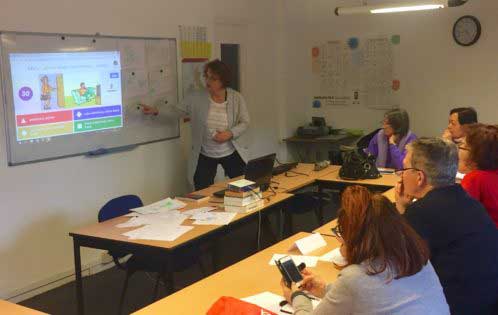If you’ve been reading this blog, you’ll know that I believe language schools and freelancers need to be aware of current educational trends in order to uncover new chances and stand out in the local market. In this post, I’ll look at what’s happening in schools and society as a result of lifestyle changes brought on by the pandemic, technology, and the economy. Based on that, you should be motivated to organize distinctive courses that will increase enrollments. Ready? Let’s get this party started:
Microlearning is a growing trend
Microlearning in TEFL is the practice of studying little pieces of language whenever and wherever possible. It is not new, but because to our hectic lifestyle, it has just recently become a rapidly expanding trend in education. Another driver of microlearning is, among other things, Zoom fatigue and the ubiquitous use of mobile devices, which allows learners to easily access microlearning.
Many language schools and TEFL teachers are capitalizing on this social media trend in education and lifestyle. They regularly offer fascinating and instructive content, allowing students to learn on the go and assisting them in remembering new language.
Although microlearning cannot replace a course, it may undoubtedly add value to it and, more importantly, to your brand. Furthermore, it might be a terrific opportunity for you to retain students while also reaching out to new potential students.
Another effect of microlearning on TEFL is that learners are less likely to enrol in extensive language courses. Now there are fewer than ever before! As a result, I see a potential here to create courses in small modules so that students can select only the ones they are interested in. This could be especially beneficial for busy learners who are at least at an intermediate level.
The trend of lifelong learning
Rapid technological advancement, paired with longer life duration, has produced a demand for life-long learning. On the one hand, employees must maintain their competitive edge, while elderly learners must continue to study for job or merely to keep their minds engaged. This educational and lifestyle trend benefits TEFT by generating more potential learners.
Given this solidified trend in education, there are numerous prospects for language schools and TEFL freelancers. However, it is critical that courses address the special needs of this sort of students.
Soft skills training in the workplace
This means that language schools and freelancers have an opportunity to offer courses in which firm employees learn new skills like critical thinking and problem-solving in English. If you have been offered such courses, you would put yourself or your language school in a unique and competitive position in your market in 2022.
This is just another reason to consider developing courses to help instructors and students in public schools develop life skills such as critical thinking, stress management, entrepreneurship, and problem-solving.
Digital Literacy
Another emerging trend (or should I say “need”) in education is the teaching of Digital Literacy in all of its forms, from basic netiquette to digital well-being. This is critical for students to survive and prosper in an ever-changing digital environment at school and at employment.
Because of the rapid move to remote online work and remote online learning, workers, students, and teachers who are less technologically proficient require assistance. Keeping this in mind, explore how you can assist them through your language services. Language courses that encourage and teach digital literacy will most certainly be popular in 2022.
Hybrid training for the new normal
The pandemic has driven courses online, and even when they return face to face, there will be occasions when learners choose or need to continue online. Online and hybrid education is a trend in education that will continue in 2022. Because of their versatility, I believe that online and hybrid will be there long after the pandemic is finished.
Meanwhile, this educational trend has had a significant impact on TEFL in terms of materials, lesson planning, and teacher training. It is critical for a language school or freelancer to be prepared to change from face-to-face to online teaching overnight and to offer hybrid instruction if necessary. Offering hybrid education is a solid method for retaining or even attracting students.









